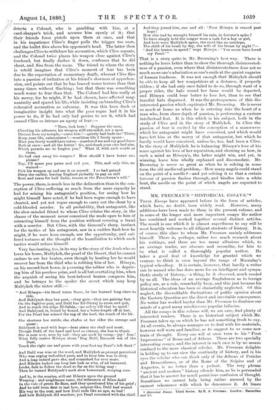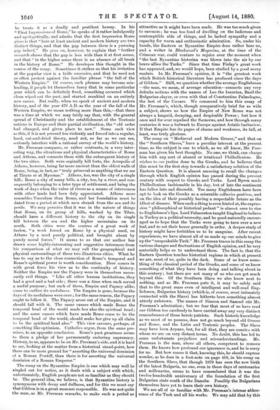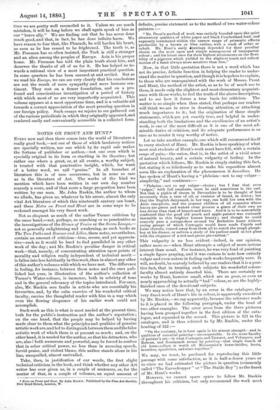MR. FREEMAN'S "HISTORICAL ESSAYS."*
THESE Essays have appeared before in the form of articles, which have, uo doubt, been widely read. However, many additions have been made to them in the present volume, and
in some of the longer and more important essays the author has combined and worked together several distinct articles.
The result is one which it is almost superfluous to say will be most heartily welcome to all diligent students of history. It is, of course, this class to whom Mr. Freeman mainly addresses himself. There is, perhaps, rather too much research about his writings, and there arc too many allusions which, to an average reader, are obscure and recondite, for him to be what is called a thoroughly popular author. He takes a good deal of knowledge for granted which we venture to think is even beyond the range of Macaulay's typical schoolboy. It is certain, however, that hardly a writer can be named who has done more for an intelligent and sympa- thetic study of history,—a thing, be it observed, much needed by us all. The ideas of an average Englishmen as to foreign policy are, as a rule, remarkably hazy, and this just because his historical education has been so shamefully neglected. Of this neglect, the discreditable fluctuations of public opinion about the Eastern Question are the direct and inevitable consequence. No writer has worked harder than Mr. Freeman to disabuse our minds of a good many mischievous popular fallacies.
All the essays in this volume will, we are sure, find plenty of interested readers. There is no historical subject which Mr. Freeman takes up on which he has not something fresh to say. At all events, he always manages so to deal with his materials, however well worn and familiar, as to suggest to us some new train of thought. Every one will at once turn to his " First Impressions" of Rome and of Athens. These are two specially interesting essays, and the interest in each case is by no means confined to the mere classical scholar. Mr. Freeman delights in holding up to our view the continuity of history, and in his eyes the scholar who can think only of the Athens of Pericles and Demosthenes, or of the Rome of the Scipios and of Augustus, is no better than a pedant. The very phrase " ancient and modern " history offends him, as he is persuaded that it has to answer for much pernicious confusion of thought. Sometimes we cannot help being rather amused by the earnest vehemence with which he denounces it. At times
• Historical Buoys. Third Berke. By E. A. Freeman. London : Macmillan and Co.
he treats it as a deadly and pestilent heresy. In his "First Impressions of Rome," he speaks of it rather indulgently and apologetically, and admits that the first impression Rome gives is that "here at least ancient and modern history are two distinct things, and that the gap between them is a yawning gap indeed." He goes on, however, to explain that "further research shows that the gap is less wide than it at first seems, and that " in the higher sense there is an absence of all break in the history of Rome." He developes this thought in the course of the essay. Sometimes it strikes us that his irritation at the popular view is a trifle excessive, and that he need not so often protest against the familiar phrase " the fall of the Western Empire." Of course, such phrases may become mis- leading, if people let themselves fancy that in some particular year which can be definitely fixed, something occurred which clean wiped out the past, and started mankind on an entirely new career. But really, when we speak of ancient and modern history, and of the year 476 A.D. as the year of the fall of the Western Empire, we mean nothing more than this,—that there was a time at which we may fairly say that, with the general spread of Christianity and the establishment of the Teutonic nations in Europe and their partial civilisation, the " old order had changed, and given place to new." Some such view as this, if it is not pressed too violently and forced into a regular, hard, cut-and-dried theory, need not, so far as we can see, seriously interfere with a rational survey of the world's history.
Mr. Freeman compares, or rather contrasts, in a very inter- esting way, the situations and physical characteristics of Rome and Athens, and connects them with the subsequent history of the two cities. Both were orginally hill forts, the Acropolis of Athens, however, being far more ancient than the oldest walls of Rome, being, in fact, as " truly primeval as anything that we see at Tiryns or at Mycenae." Athens, too, was the city of a single hill; Rome a city of many hills, a city, too, by a river, and con- sequently belonging to a later type of settlement, and being the work of days when the value of rivers as a means of intercourse with other lands had been duly appreciated. Athens more resembles Tusculum than Rome, and her foundation must be dated from a period at which men shrank from the sea and its perils. We may perceive that it was in the nature of things that Rome, on its group of hills, washed by the Tiber, should have a different history to the city on its single hill between the sea and the higher mountains on its north. Both cities were the centres of a great work of fusion, " a work forced on Rome by a physical need, on Athens by a need purely political, and brought about by purely moral forces." It seems to us that our author has drawn sonic highly-interesting and suggestive inferences from his comparison of what we may call the geographical and physical surroundings of these two illustrious cities. What he has to say as to the close connection of Rome's temporal and Rome's spiritual power is worth consideration. Here comes in with great force his view as to the continuity of history. Neither the Empire nor the Papacy were in themselves neces- sarily evil things. " Like all other human institutions, they had a good and a bad side ; there was a time when each served a useful purpose ; but each of them, Empire and Papacy alike, came to outlive its usefulness. The Empire is gone, because the days of its usefulness were over ; for the same reason, the Papacy ought to follow it. The Papacy arose out of the Empire, and it should fall with it. The same causes which made Rome the temporal head of the world made her also the spiritual head; and the same causes which have made Rome cease to be the temporal head of the world, should make her give up all claim to be the spiritual head also." This view savours, perhaps, of something like optimism. Catholics argue, from the same pre- mises, to an opposite conclusion. Rome's past greatness seems to them a pledge of her permanently enduring supremacy. History, to us, appears to be on Mr. Freeman's side, and it is hard to see, looking at the matter from a historical stand-point, how there can be more ground for "asserting the universal dominion of a Roman Pontiff, than there is for asserting the universal dominion of a Roman Emperor."
The essay on the Byzantine Empire is one which may well be singled out for notice, as it deals with a subject with which, unfortunately, English people are not so familiar as they should be. The general idea, we believe, is that Byzantine history is synonymous with decay and dullness, and for this we must say that Gibbon is in a great measure responsible. He was not quite the man, as Mr. Freeman remarks, to make such a period as
attractive as it might have been made. He was too much given to sarcasm ; he was too fond of dwelling on the ludicrous and contemptible side of things, and he lacked sympathy and a capacity, for warm and enthusiastic admiration. So, under his hands, the Eastern or Byzantine Empire does rather bore us, and a writer in Blackwood's Magazine, at the time of the Crimean war, could venture to rejoice over the moment when "the last Byzantine historian was blown into the air by our brave allies the Turks." Since that time Finlay's great work has appeared, and, we would hope, been studied by a good many readers. In Mr. Freeman's opinion, it is "the greatest work which British historical literature has produced since the days of Gibbon." Still, we question whether the average Englishman —the man, we mean, of average education—connects any very definite notions with the names of Leo the Isaurian, Basil the Bulgarian-slayer, or even with that of Constantine Palmologus, the last of the Camara. We commend to him this essay of Mr. Freeman's, which, though comparatively brief for so wide a subject, shows us how the Empire of New Rome was not always a languid, decaying, and despicable Power ; but how it once and for ever repulsed the Saracens, and how through many centuries it was a bulwark to Europe against Asiatic barbarism. If that Empire has its pages of shame and weakness, its fall, at least, was truly glorious.
The essay on "Mediaeval and Modern Greece," and that on the " Southern Slaves," have a peculiar interest at the present time, as the subject is one to which, as we all know, Mr. Free- man has given his best thoughts. No one, we think, can charge him with any sort of absurd or irrational Philhelleuism. He wishes to see justice done to the Greeks, and he believes that this must be the first step towards a satisfactory solution of the Eastern Question. It is almost amusing to recall the changes through which English opinion has passed during the present century with respect to Greeks and Turks. Lord Byron made Philhellenism fashionable in his day, but of late the sentiment has fallen into sad discredit. Too many Englishmen have been apt to look on the Greeks as a miserable colluvies gentium, and on the idea of their possibly having a respectable future as the idlest of dreams. When such a thing is even hinted at, the expres- sion " philosophical or historical pedant" is almost sure to rise to Englishmen's lips. Lord Palmerston taught England to believe in Turkey as a political necessity, and he good-naturedly encour- aged us to hope that the Turks were going to turn over a new leaf, and to set their house generally in order. A deeper study of history might have forbidden us to be sanguine. After recent experiences, we have almost all of us made up our minds to give up the " nnspeakable Turk." Mr. Freeman traces in this essay the various changes and fluctuations of English opinion, and he very materially helps us to understand them. The fact is, that the Eastern Question touches historical regions in which at present we are, most of us, quite in the dark. Some of us know some- thing of the classical period of the Greeks, and some of us know something of what they have been doing and talking about in this century ; but there are not many of us who can get much beyond this. Of the Southern Slays we also know next to nothing, and as Mr. Freeman puts it, it may be safely said that to the great mass even of intelligent and well-read Eng- lishmen, Bulgarian history (which is, of course, most intimately connected with the Slays) has hitherto been something almost utterly unknown. The names of Simeon and Samuel stir Mr. Freeman's admiration ; but we fear that most of us have read our Gibbon too carelessly to have carried away any very distinct remembrance of those heroic patriots. Such historic knowledge as we most of us possess, does not go much beyond old Greece and Rome, and the Latin and Teutonic peoples. The Slays may have been Aryans, but, for all that, they are cousins with whom we are on very distant terms. No doubt, this has led to some unfortunate prejudices and misunderstandings. Mr. Freeman is the man, above all others, competent to remove them. He knows how profound our ignorance is, and he is sorry for us. But how comes it that, knowing this, he should express wonder, as he does in a foot-note on page 418, in his essay on the Southern Slays, that though 1879 has seen the new birth of the latest Bulgaria, no one, even in these days of centenaries and millenaries, seems to have remembered that it was the twelve-hundredth anniversary of the foundation of the first Bulgarian state south of the Danube. Possibly the Bulgarians themselves have yet to learn their own history.
We are all of us familiar with Mr. Freeman's intense abhor- rence of the Turk and all his works. We may add that by this time we are pretty well reconciled to it. Unless we are much mistaken, it will be long before we shall again speak of him as our "brave ally." We are finding out that he has never done much good, and that, in fact, he has done infinite harm. We have reason to fear that, like Pharaoh, he will harden his heart, as soon as he has ceased to be frightened. The truth is, as Mr. Freeman has so often insisted, the Turk is still a stranger and an alien among the peoples of Europe. Asia is his proper home. Mr. Freeman has told the plain truth about him, and deserves the thanks of all of us for it. He has helped us to- wards a rational view of a most important practical question. In some quarters he has been sneered at and reviled. But as we read his Essays, we can see very clearly that his conclusions are not the result of mere sympathy and mere humane sen- timent. They rest on a firmer foundation, and on a pro- found and conscientious investigation of a period of history with which most of us are very imperfectly acquainted. This volume appears at a most opportune time, and is a valuable aid towards a correct appreciation of the most pressing question in our foreign policy. Such essays we rejoice to see gathered out of the various periodicals in which they originally appeared, and rendered easily and conveniently accessible in a collected form.
































 Previous page
Previous page